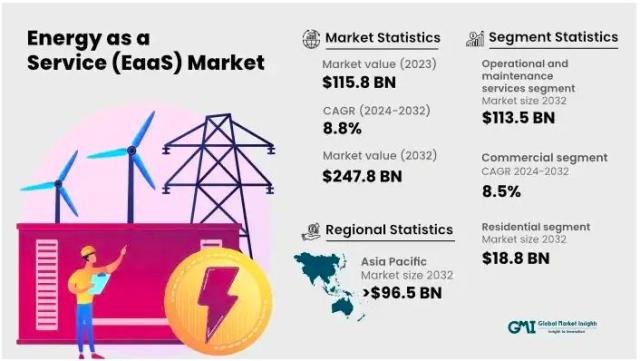The Energy as a Service (EaaS) Market size will expand at over 8.8 percent CAGR from 2024 to 2032, due to the technological advancements and innovative solutions.
Leading solution providers are rolling out cutting-edge solutions, enhancing energy management and efficiency across diverse sectors. Moreover, these advancements facilitate the integration of technologies like smart grids and energy storage systems, bolstering efficiency and reliability. For example, in February 2023, the Air Force initiated an Energy-as-a-Service pilot program, aiming to boost energy efficiency and management through novel solutions. This venture delves into advanced technologies, aiming to refine energy usage and sustainability in its operations.
In terms of type, the energy supply service segment in the EaaS industry is set to experience growth at a notable rate through 2032. This is attributed to the rising demand for holistic solutions encompassing energy management, optimization, and efficiency. The energy supply service model provides customized solutions, leveraging advanced technologies like smart grids and energy storage systems. Providers are also expanding their offerings beyond mere energy supply, aiming to elevate overall energy performance and sustainability.
By end-use, the energy as a service market share from the industrial segment is projected to rise from 2024 to 2032. This growth is fueled by the increasing adoption of EaaS across the industrial sector for enhanced energy management and efficiency. By harnessing advanced technologies, industries are not only optimizing energy consumption but also aiming for improved operational efficiency and reduced energy costs.
Regionally, the Europe energy as a service industry size is projected to depict strong growth between 2024 and 2032 driven by escalating investments in smart infrastructure. EaaS providers in Europe are harnessing technologies like smart grids, energy storage, and real-time monitoring, crafting more efficient and adaptable energy solutions. These advancements not only boost energy efficiency but also play a pivotal role in Europe’s shift towards sustainable and intelligent energy systems.

